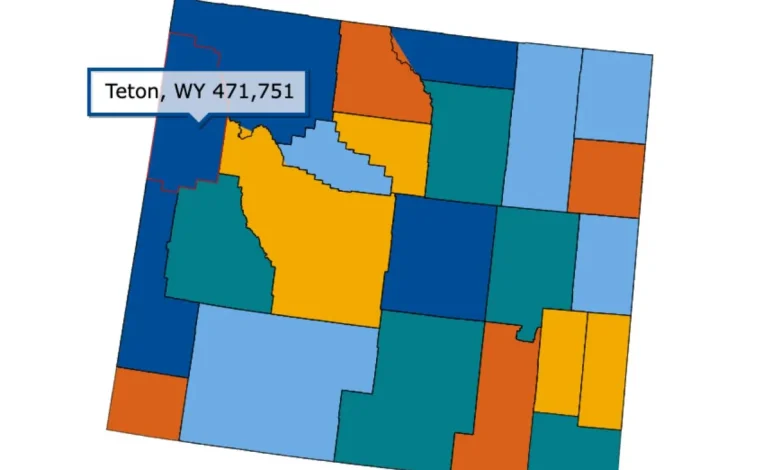Teton County, Wyoming, has retained its position as the wealthiest county in the United States, with an average per capita income of $471,751 in 2023, Oil City News reports.
This figure, according to the federal Bureau of Economic Analysis, is nearly seven times Wyoming’s average and 6.7 times the national average of $69,810. Jonathan Schechter, a local economic consultant and Jackson Town Council member, attributes the region’s unprecedented wealth to factors including investment income, tax policies, and demographic shifts accelerated by the COVID-19 pandemic.
Schechter’s analysis highlights that the extraordinary income levels are not representative of the typical Teton County resident. “It Ain’t Me Babe,” the title of his latest newsletter, underscores the disparity.
“On average, every person living in Teton County in 2023—regardless of age or employment status—earned $471,751, but the reality for many is far different,” he explained.
The absence of median income data complicates the picture, but Schechter emphasizes that the wealth concentration is not limited to a handful of individuals. The county’s affluence is primarily driven by a small but influential segment benefiting from significant investment income. This, combined with Wyoming’s tax-friendly environment, creates stark contrasts in wealth distribution.
State policies play a central role in Teton County’s wealth, with Wyoming’s tax structure favoring high-income earners. Despite representing only 4% of the state’s population, Teton County residents generated 23% of Wyoming’s total personal income in 2023. Schechter attributes this to the 2017 federal tax cuts and the influx of remote workers during the pandemic, which enabled high-income individuals to settle in the picturesque area without sacrificing career opportunities.
“People are increasingly choosing to move to where they want to live rather than where work forces them to live,” Schechter noted.
He highlighted a broader trend of affluent professionals relocating to resort towns like Jackson Hole, Aspen, and Park City.
While investment income and property values have surged, wages for location-dependent jobs have not kept pace. The cost of living in Teton County is exceptionally high, with a two-bedroom apartment averaging $3,354 per month. Housing affordability remains a critical issue, exacerbated by soaring home prices and limited local tools to address the crisis, such as a real estate transfer tax.
Schechter warns that if further federal tax cuts for the wealthy are enacted, communities like Jackson Hole will face intensified challenges related to investment income, rising property values, and growing inequality.
“To resolve the affordable housing crisis, you have to repeal the law of supply and demand,” he stated.
Tourism is another significant contributor to Teton County’s economy, generating more than half of Wyoming’s 3% lodging tax revenue in fiscal year 2024. The county’s residential property accounts for 35% of the state’s total assessed value, despite its small population.
However, the county’s wealth has also made it a target in state politics. Rep. Andrew Byron (R-Jackson) pointed out the challenges of conveying Teton’s unique economic dynamics to lawmakers from other regions. He noted the difficulty in attracting state committee meetings to Jackson due to high hotel costs, despite local efforts to address housing and environmental preservation.
“When they visit and see our efforts, it can help break down stereotypes,” he said.









